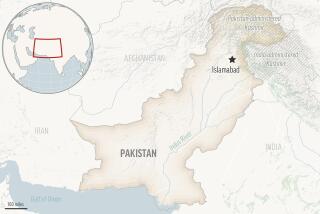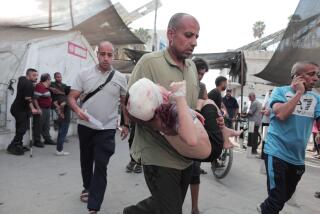Pakistan blames Taliban-allied militants in Lahore attack
ISLAMABAD, PAKISTAN, AND ISTANBUL, TURKEY — Pakistani authorities Monday blamed Taliban-linked militants for a daylong assault on a police academy outside the eastern city of Lahore that left about 20 people dead, including at least four of the assailants.
In a chillingly methodical strike, heavily armed gunmen stormed the training center as recruits gathered for morning drills. The assailants held off elite army and paramilitary troops for nearly eight hours before finally being overpowered. At least three of the attackers blew themselves up as troops overran their last stronghold, an upper floor in the compound’s main building.
Afterward, black-clad Pakistani commandos chanted “God is great!” and fired off rounds of celebratory gunfire.
The audacious attack was yet another sign of the intensifying turmoil in Pakistan, considered a crucial U.S. ally in the fight against Islamic militants even though the year-old civilian government has been struggling to stay in control. President Obama declared last week that quelling the insurgency in Pakistan was key to success in the war in neighboring Afghanistan. He tied the continuation of U.S. aid to progress in confronting the militants.
The assault on the police compound, which began about 8 a.m., was swift and sudden. Pakistani news reports cited witnesses as saying that the gunmen, some in civilian dress and some in what appeared to be police uniforms, hit the lightly guarded compound from several directions at once, hurling grenades and gunning down police cadets on the compound’s parade ground.
After initial confusion, hundreds of army and paramilitary troops, including elite Rangers, were rushed to the scene. The Dawn news television channel reported that a helicopter was hit by gunfire as it flew in troops, but landed safely.
Shortly before 4 p.m., acting Interior Minister Rehman Malik said that authorities had regained control of the compound. He later told reporters that the attackers were linked to Baitullah Mahsud, head of Pakistan’s Taliban movement.
About 90 people were reported hurt, with many of the wounded trapped inside for hours as the battle raged. Some police trainees said they leaped from windows or scaled the compound’s high walls to get away.
At one point, the assailants appeared to repel an armored personnel carrier that tried to enter the compound. The provincial governor, Salman Taseer, described the chaotic events as a “total siege.”
It was the second major attack within a month in Lahore, the cosmopolitan capital of Punjab province and once considered a relatively peaceful corner of the country. On March 3, six police guards and a bus driver were killed when gunmen attacked the visiting Sri Lankan cricket team.
Monday’s attack was also reminiscent of the November onslaught in Mumbai, when teams of gunmen hit luxury hotels and other sites around India’s commercial capital in a series of coordinated strikes, leaving nearly 170 people dead.
In Lahore, the police trainees who were in the compound as the attack unfolded described an operation almost military in its precision.
“They kept on spraying bullets at us without stopping, and I saw many of my colleagues getting hit, crying out and falling to the ground,” said Mohammed Atif, 23, a recruit who suffered minor injuries.
Throughout the day, Pakistanis were transfixed by live TV coverage of the assault, which included images of dead police recruits lying inside the compound. A captured assailant was shown prone on the ground, being kicked by police before they hauled him to his feet and led him away.
Analysts said the attackers may have been seeking to demoralize the government by humiliating the security forces. Many recruits could be seen sobbing as they emerged from the compound. Some quit the force on the spot.
“It’s very likely this group had perfect knowledge of the targets and knew the operational environment well,” said Rohan Gunaratna, director of the International Center for Political Violence and Terrorism Research in Singapore. “They had familiarity with law enforcement operations and their targets, and studied them very carefully over a period of time.”
--
Zaidi is a special correspondent. Times staff writer Mark Magnier in New Delhi contributed to this report.
More to Read
Sign up for Essential California
The most important California stories and recommendations in your inbox every morning.
You may occasionally receive promotional content from the Los Angeles Times.










